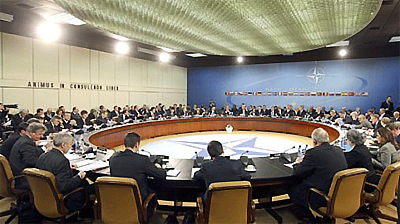NATO refutes Russian claim was promised no expansion

(Business New Europe MOSCOW BLOG – bne.eu – Ben Aris in Moscow – April 15, 2014)
The Kremlin is very unhappy about the EU’s bid to pull Ukraine into its economic orbit through the Association Agreement that Ukrainian President Viktor Yanukovych failed to sign in November. But what really gives Moscow the willies is Nato’s unrelenting march eastwards over the last two decades. In a statement released on April 14, Nato poured oil on that smouldering fire by saying explicitly it never promised not to move the alliance up to Russia’s borders. The aggressive tone of the statement will only serve to be yet another red flag waved in Moscow’s face.
Russian President Vladimir Putin specifically highlighted Nato’s expansion as Russia’s biggest beef with the West in his historic speech on March 18, when he announced the annexation of Crimea. The Kremlin has also been unsettled by the security clauses in the EU’s Associate Agreement that look like starting the process of making Ukraine’s military materiel compatible with Nato’s.
“The political provisions of the association deal pave the way for further entrenchment of Ukraine into the foreign policy and military orbit of the EU and the West in general,” a Russian foreign ministry official told RIA Novosti a few days ago.
Nato’s line on expansion is reasonable: the alliance will let in anyone that wants to join and for obvious reasons a lot of the small states that were part of the Soviet bloc signed up. However, the alliance was (and is) specifically created to counter Russia’s military might, so from Moscow any expansion looks threatening.
Nato has done nothing to allay those fears. Several European leaders, realising how touchy Moscow would be to more talk of expansion, have tried to play down any suggestion that Nato could extend into Ukraine. German Foreign Minister Fran k-Walter Steinmeier said explicitly on April 6 after a meeting with the alliance’s top brass: “Nato membership for Ukraine is not on the cards.” And even Ukrainians of all stripes have tradtionally not seemed that keen about membership; according to Gallup, as recently as last summer more Ukrainians were considered Nato a threat (29%) to their country than as protection (17%), while even more Ukrainians were likely to view it as neither (44%).
However, the supreme commander of Nato in Europe, US Air Force General Philip Breedlove, doesn’t seem to have got the memo. A few days earlier Breedlove made a statement that Nato troops, including those from the US, could be deployed to Eastern Europe in an effort to, “shore up defences in allied countries that share a border with Russia” – although he avoided naming Ukraine specifically. Other countries that border Russia to the east include Belarus, Latvia, Estonia and Finland, of which the last three are also Nato members. From t he Russian perspective, Breedlove’s comments will make Nato look like it is a tool of US foreign policy, rather than an alliance with Europe.
In this context, Nato on April 14 released a statement entitled, “Russia’s accusations – setting the record straight,” which contradicts Russia’s narrative on the whole vexed issue of Nato expansion. “Russian officials claim that US and German officials promised in 1990 that Nato would not expand into Eastern and Central Europe, build military infrastructure near Russia’s borders or permanently deploy troops there. No such pledge was made, and no evidence to back up Russia’s claims has ever been produced,” the statement says.
Putin first raised the issue of what Russia was promised during his speech at the Munich Security Conference in 2007, where he explicitly said that Nato had promised not to expand to Russia’s borders. The key meeting at this time was the negotiations between Soviet premier Mikhail Gorbachev and German Chancellor Helmut Kohl in 1989 that enabled the reunification of Germany. However, the content of what was said at that meeting has never been released. Putin seems to be saying that Kohl made Gorbachev a verbal promise not to expand, though nothing was put down on paper.
Hardening stance
The mere title of the Nato statement highlights the hardening of the alliance’s stance on Russia’s military operations on the Ukrainian border. Its aggressive tone will not go down well in Moscow. Putin complained in his March 18 speech that Russia was continuously presented with a fait accompli by the West and told, “This does not concern you,” when it complained.
Nato’s statement drove that point home again when explaining why Russia had no right to object to Nato’s proposed missile defence shield in Europe: “Nato has not ignored Russia’s concerns [to the shield]. On the contrary, the Alliance has consistently sought cooperation with Russia on missile defence. At the Lisbon Summit of 2010, Nato Heads of State and Government, ‘decided to develop a missile defence capability to protect all Nato European populations, territory and forces, and invited Russia to cooperate with us’.”
To Moscow, this statement will be taken as more evidence of the West’s fait accompli policy towards Russia; “cooperate” doesn’t seem to give Moscow the option to “object” to the shield, as it most vehemently does.
The increasingly tough talk bodes ill for a diplomatic solution to the current standoff between Russia and the US (and to a lesser extent a reluctant, but unsettled, Europe) over Ukraine. Brandishing military power will not intimidate the Kremlin, but unfortunately the war of words will make the lingering Cold War fears of renewed Russian aggression in Europe a self-fulfilling prophesy. It will also justify the continued existence of Nato, instead of a new European Security Agreement the Russians have called for, something that would hav e helped prevent the current tense situation.
